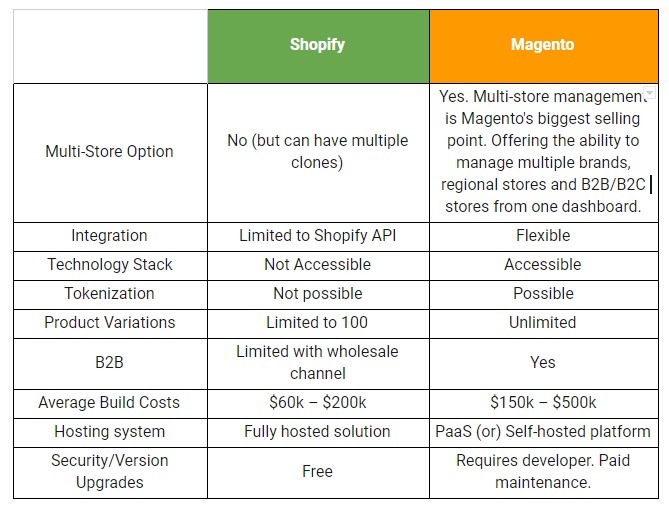In the battle between Magento Commerce vs. Shopify Plus, one thing is certain: these two platforms are pro-level to the max.
Both platforms have been designed for successful stores, but with their added functionality comes added cost and it’s recommended that you upgrade to either enterprise plan if you’re doing over half million in revenue a year, you have the budget to hire experts and you’re looking to increase markets or channels. Here’s a short description of each.
Magento has been a steady climber since being founded in 2008 and was the second most used Shopify alternative in 2017. Magento Commerce (On-Premises), formerly Magento Enterprise Edition, includes many more features and much more functionality than Magento Open Source and is designed for medium to large businesses in need of extra configuration, usage, installation and technical support. There are many big brands taking advantage of Magento’s functionality including Coke, Ford, Fox Content, Warby Parker, Rebecca Minkoff and Nike.
Side Note: If you’re already using Magento 1 and are thinking of moving over to Magento Enterprise, it is more of a rebuild than a lateral move. Meaning you would still need to evaluate whether the change would be beneficial to you.
Shopify, on the other hand, also has an impressive list of big brands including Budweiser, Wateraid, New York Times shop, Penguin Books and Red Bull. Launched in 2014, Shopify Plus (Enterprise) may be younger than Magento but packs a big punch. As the pro level of Shopify, it offers medium and larger businesses more customization, international eCommerce features, more hands-on support and multi-channel management capabilities
Choosing the right eCommerce platform can have a huge impact on the ease, spend and logistics involved in taking your 7-figure eCommerce business to the next level. So, which one is best? It all depends on your specific needs, products, market and eCommerce objectives, and the choice you make is super important.
To help you choose your next eCommerce platform upgrade, we broke down the most significant selling points to find the answers to who wins when it comes to Magento eCommerce vs. Shopify Plus. These include:
- Multi-store management
- Pricing and cost
- Scalability
- Business management
- Flexibility
- International commerce
Multi-Store Management
If being able to manage an unlimited number of online storefronts as efficiently as possible is important to you, then Magento wins on the multi-store management front. Unlike currently with Shopify Plus, Magento Commerce has more advanced multi-store capabilities, allowing brands to manage a multitude of storefronts from one account interface.
The benefits are being able to create different websites and storefronts with a central panel that lets you change themes and edit extensions so that each store has its own identity. Magento Commerce has four hierarchical levels: global, website, store and store view.
This is not to say Shopify Plus doesn’t offer its own multi-store features. Shopify now allows for dedicated storefronts for customizing international eCommerce and a personalized wholesale channel for their high-volume customers.
Pricing and Cost
When it comes to choosing between the costs of Magento and Shopify enterprise solutions, there is more to consider than just the monthly expenses of the platforms themselves. In a nutshell, Shopify Plus’s total costs add up to a little less than Magento Enterprise, making it more affordable for medium-sized businesses. Let’s compare the licensing, build and maintenance costs of each.
License Costs
Shopify Plus and Magento Commerce each have license costs to consider and are roughly based on a store’s revenue. Magento charges this upfront annually based on ‘gross merchandise value,’ with a minimum of $22k. While Shopify Plus charges a minimum fixed rate of $2,000 (plus payment fees) month-to-month.
Build Costs
Although Shopify Plus developers can charge higher hourly rates than Magento developers, Shopify is generally cheaper to build. This is because Shopify Plus, on average, requires less complicated backend and integration work, and customization trends to take less time than Magento, resulting in lower agency costs. For Magento, you are looking at anything from $150-500k for building, design and development, while you would see costs of around $60-200k for Shopify.
Maintenance Costs
When comparing Shopify Plus and Magento management costs, you need to compare hosting, site tweaks and bug fixes, and functionality updates.
With regards to security patches, Shopify Plus works out cheaper as the platform handles these for you. This is because Shopify Plus includes hosting in their monthly fee, meaning no additional costs and admin will need to go into ensuring your security patches, downtime, PC compliance and SSL certificate are monitored and handled.
On the other hand, Magento offers two options for hosting: Magento Commerce Cloud Hosting and third-party hosting. The former will be an additional fee on top of your licensing fee. The latter allows you to find a hosting company and package you prefer. However, you will need to consider the monthly costs of a separate hosting company.
Bonus Content: How to Choose the Right Hosting Solution for Your eCommerce Store
Scalability
Another important comparison point between Magento Commerce and Shopify Plus is their scalability. This means having the flexibility to adapt to changing markets, growing with increased traffic and functionality upgrades. This means having access to the latest tech and being able to set languages and currencies while growing your global business. In this regard, Magento has far more options available; however, Shopify Plus is generally more user-friendly and can be integrated more easily.
As we saw in the intro, there are many high-profit brands using both platforms with ease, and both platforms are known for their technology vision. Choosing between the two should be based on what your business objectives are, ensuring the platform you choose has the functions and flexibility you need to meet your unique eCommerce business goals. Which bring us to our next comparison…
Flexibility
When it comes to flexibility, Magento Commerce is the clear winner. However, before you jump for it, you need to decide how much flexibility your specific business will need. If you have an average eCommerce business with an average site and you don’t wish to reinvent the wheel with your products, Shopify Plus’s feature range will be sufficient and flexibility shouldn’t be the deal-breaker for you.
However, if you’re looking to build something unique with a variety of promotion and product options, then Magento will be the option for you. Let’s say you want to start offering products in multiple colors, materials, design options and finishes; Magento will provide more flexibility in terms of defining different products.
Business Management
Some of the biggest eCommerce stores run a lean business, meaning business management and reporting efficiency are key to growing their business. Shopify Plus includes 13 detailed sales reports that are all included in your monthly fee.
In this regard, Magento Enterprise has improved leaps and bounds since the first version, including 8 detailed sales reports. Overall, both are quite similar with regards to management tools and reporting.
Overall, Shopify Plus takes a small lead with regards to reporting summaries. However, not by a huge enough margin for this to be the only consideration for choosing between the two.
International Commerce
Although Shopify rolled out multi and some local currencies functionality for Plus this year, Magento’s multi-store management abilities and flexibility still put it in the lead as far as building a global business. Again, choosing between the two based on global capabilities will depend on your vision for international selling. Here’s a breakdown of what Shopify Plus gets you in terms of global selling:
- A SaaS platform that can handle your volume
- Global dual CDNs for speed and functionality
- PCI Level 1 compliant
- Robust Shopify API to connect you to your global solutions, like ERP, 3PL, OMS, IMS and more
- Integration with international warehouses and fulfillment solutions
Pro Tip: Want to find out which platform your competitors are using? Find out how – here.
Magento Commerce vs. Shopify Plus: Tech Summary
Conclusion
In conclusion, each platform has its benefits and choosing one should depend on your current revenue and your business aspirations. If you’re doing less than $1 million a year, you’re probably better off with Shopify advanced, WooCommerce or Magento. If you’re doing $1 million or more and don’t plan on adding too many more stores to your portfolio and want to keep costs and design simple, Shopify Plus would be a good option for you. For those of you looking to build your portfolio on a large, international scale and are close to generating $5 million in revenue per year, Magento Enterprise would offer you more flexibility.

Nicole is a content writer at StoreYa with over sixteen years experience and flair for storytelling. She runs on a healthy dose of caffeine and enthusiasm. When she's not researching the next content trend or creating informative small business content, she's an avid beachgoer, coffee shop junkie and hangs out on LinkedIn.
Recommended articles
 Facebook Ads for eCommerce: 16 Strategies, Examples & Tips
Facebook Ads for eCommerce: 16 Strategies, Examples & Tips
 How to Build a Winning eCommerce Ads Strategy
How to Build a Winning eCommerce Ads Strategy
 Google Ads for eCommerce: Everything You Need to Know
Google Ads for eCommerce: Everything You Need to Know
 10X Your Traffic with PPC Management Software
10X Your Traffic with PPC Management Software
Comments
Powered by Facebook Comments




